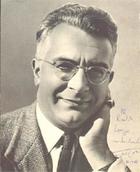
He was born in 1907 in Castres (France). He studied at Jesuit religious schools in the south of the country until his arrival at the University of Toulouse. During her adolescence in a boarding school she falls in love with a young man, from whom she will soon have to separate. This biographical event, which marks a good part of his work, is present above all in “Las amistades particular” (Egales, 2000) and, in a way, also in “Roy”. He studied Political Science and worked for the Athens Embassy between 1933 and 1938. After holding various positions in the Ministry of Foreign Affairs, he definitively abandoned his diplomatic career to devote himself exclusively to literary creation. Peyrefitte, already considered a classic of contemporary French literature, always develops a deep documentation work, especially in works of a historical nature, as well as a strong parodic and controversial streak. An extremely prolific writer, we will highlight here the novel "Les dossades", which revolves around the diplomatic environment that he knew so well for professional reasons, or "The Keys of Saint Peter" (Edhasa, 1981), an ironic work that describes the environment of the Vatican and which speaks of the hypothetical homosexuality of Pius XII, which triggered a bitter literary controversy in his time with a Catholic writer like François Mauriac. "Les amours singulières" transports us to the environment and the environment in which Baron Von Gloeden and Alexandre le Grand lived is a magnificent biography of Alexander the Great. Lastly, we will highlight the excellent political and social fresco of the interwar period described in "The Exile from Capri", a novel published by the Egales editorial in 2006.
Encouraged by the success of "The Private Friendships" he publishes various novels: "The Ambassadors", "The Keys of Saint Peter", "Our Love", "The Two Loves", ...), travel books "Du Vésuve à lÉtna "and biographies" The Exile of Capri "on the poet Fersen," The Unique Loves of Baron von Gloeden "and an extensive essay on Alexander the Great.




